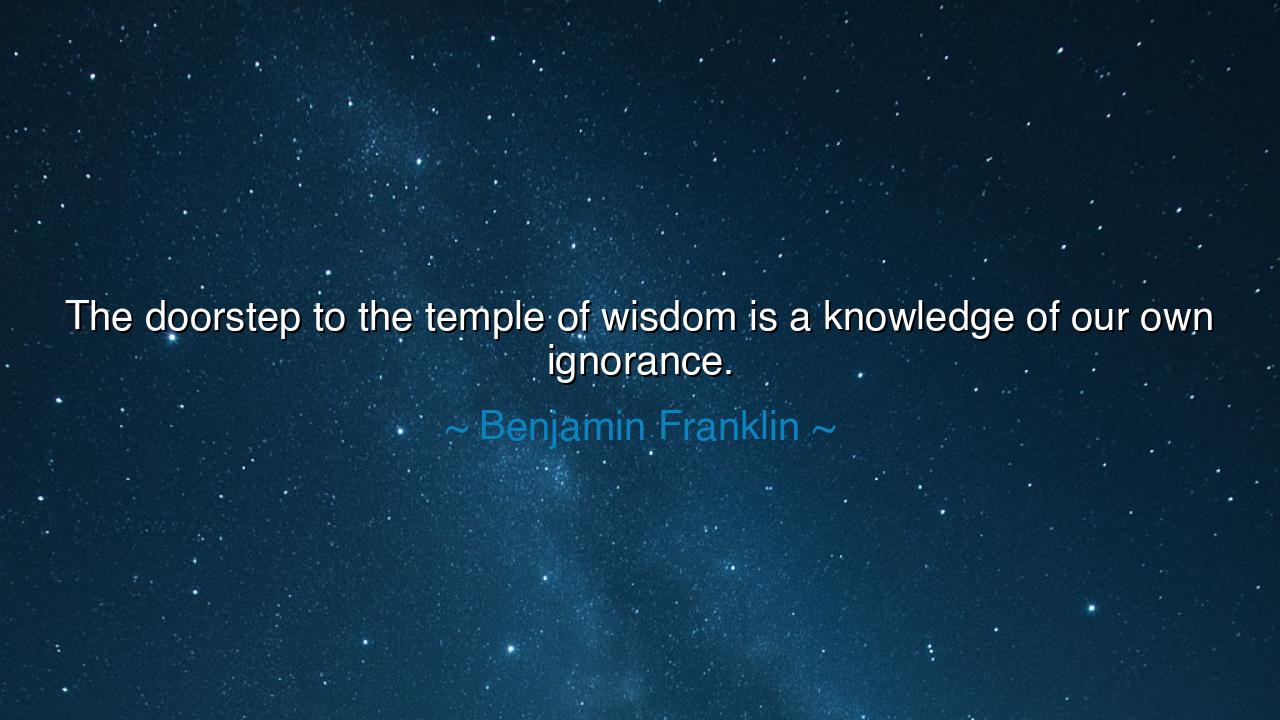
The doorstep to the temple of wisdom is a knowledge of our own






“The doorstep to the temple of wisdom is a knowledge of our own ignorance.” – Benjamin Franklin
There are few sayings as profound and enduring as this one. In these words, Benjamin Franklin reminds us that the path to wisdom begins not with pride, but with humility. To recognize one’s ignorance is not weakness—it is the sacred first step toward enlightenment. Like a traveler who bows before entering a temple, one must lower his pride to cross the threshold of true understanding. The doorstep is not the temple itself; it is merely the beginning, a place of awareness and surrender. Before the spirit can enter the house of wisdom, it must first admit: “I do not know.”
The origin of this quote reflects Franklin’s deep curiosity and lifelong discipline of learning. A printer, inventor, statesman, and philosopher, he never claimed mastery over all things. In his famous “Plan for Moral Perfection,” Franklin admitted that he often failed in virtue but grew wiser through acknowledging those failures. He was a man who believed that ignorance confessed was ignorance half conquered. His words are an echo of Socrates, who centuries earlier declared, “I know that I know nothing.” Franklin’s phrase carries this ancient flame into the age of reason, teaching that every age of discovery begins with an age of humility.
Imagine the story of a young scholar who entered the great Library of Alexandria, certain of his brilliance. He walked among the scrolls with arrogance, scoffing at older works he deemed outdated. But when a patient librarian led him to a shelf of writings he could not even read—languages forgotten by time—the scholar was struck silent. In that silence, he realized how little he knew. It was that moment of humble awe, not his pride, that opened his mind to learning. So it is with all who seek wisdom—the realization of ignorance is the first true awakening.
This truth is echoed across ages and disciplines. The scientist who doubts his results, the philosopher who questions her assumptions, the artist who recognizes the limits of her vision—these are the ones who grow. In contrast, those who believe they already possess all truth are like vessels already full: nothing more can be poured into them. Ignorance that is unacknowledged becomes a prison; ignorance that is admitted becomes a doorway. Thus, Franklin’s “doorstep” is not a place of shame, but of transformation.
History gives us vivid examples. Consider Isaac Newton, who, after formulating the laws of gravity, said, “I seem to have been only like a boy playing on the seashore… while the great ocean of truth lay all undiscovered before me.” The man who explained the cosmos confessed his smallness before it. That confession is not defeat—it is the mark of true greatness. Like Franklin, Newton stood at the doorstep of wisdom, humble before the immensity of truth.
In life, pride blinds more eyes than darkness ever could. Many stumble not because the path is hidden, but because their ego insists they already stand at the summit. Franklin’s quote is a torch to those lost in such delusion. It tells us that to learn, we must listen more than we speak, question more than we declare, and seek more than we assume. The mind that can say “I might be wrong” has already stepped toward the light.
The lesson, then, is clear and timeless: wisdom begins with humility. The first act of the wise is to bow before the unknown, to admit imperfection, and to let curiosity lead them forward. In our daily lives, this means welcoming correction, asking questions without shame, and embracing learning as a lifelong pilgrimage. Whether in study, in work, or in the quiet search of the soul, may we remember that every great temple of knowledge stands upon this single, sacred threshold: the knowledge of our own ignorance.






AAdministratorAdministrator
Welcome, honored guests. Please leave a comment, we will respond soon